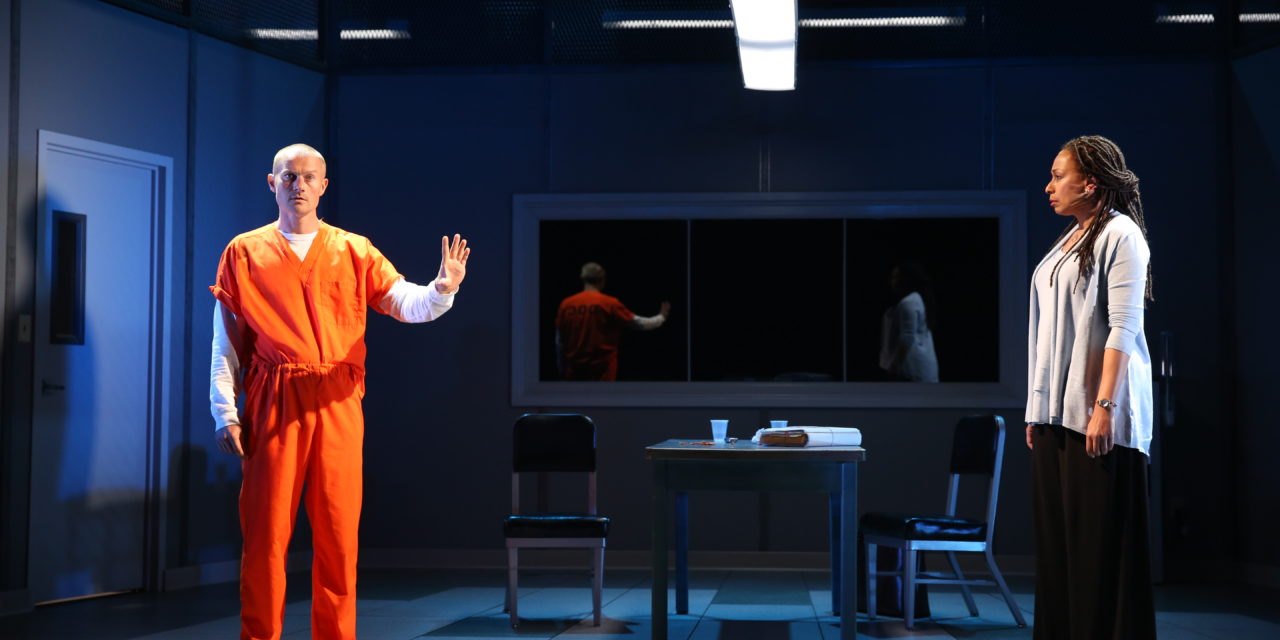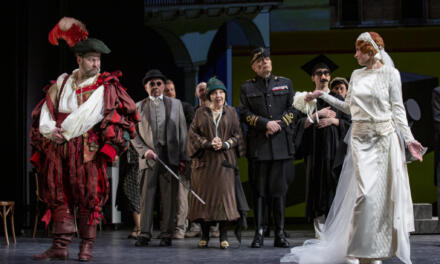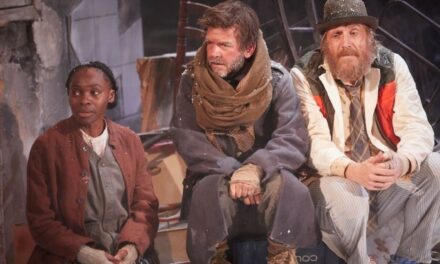Robert Schenkkan first came to national prominence in 1992, when his epic play The Kentucky Cycle became the first play to win the Pulitzer Prize for Drama before being produced in New York. All The Way, his play about former President Lyndon B. Johnson, won the Tony Award for Best Play in 2014. His new play Building The Wall is a two-hander set in the US in 2019, in a country which has devolved into a society of martial law, mass incarceration and internment camps peopled with minorities. It is currently playing Off-Broadway at New World Stages.
Jack Wernick: Your new play Building The Wall marks a shift in your writing, from fact-based historical events towards imagining the near future. What inspired this change in your writing style?
Robert Schenkkan: There are a lot of things that are different about Building The Wall. The Kentucky Cycle is my imagined recreation of 200 years of fictional history, while All The Way is very clearly based on 1964. In this case, the play is set in a near future in which two people try to make sense of the immediate past. It’s an unusual device, which safely sets the action outside the audience’s immediate experience. I also wrote this play very quickly, completing the first draft in a week. I wrote Building The Wall back in October, before the (2016 US Presidential) election. Like many people, I anticipated the results of the election would be different. Even then, I thought that we’d crossed a line, that something serious had been damaged. I felt a sense of crisis, a sense of urgency. I wanted this play out there in the world as quickly as possible, little or big theatre, red or blue state. The results have been startling. In LA the run has been extended three times. It will be produced in California and Costa Rica, Germany, France and Austria, as well as being read in London. It really speaks to what people are feeling and what they want to engage with. They also sense a crisis. The theatre is where audiences traditionally thrashed out ideas. I couldn’t be happier with this part of the journey.
JW: Building The Wall is being rolled out in a manner more akin to a film than to a play. Can you explain a bit about this approach to theatre production?
RS: I have built this piece with a minimal set in mind. It’s designed to be very portable and economical to produce; that’s deliberate. I wanted to make this play as accessible as possible. No holding back on the licensing, no trying to save it for the regional theatre. It’s about getting this story out there while it matters, while it’s critical. It has meant me giving up some power, some control. In a world premiere, I’m more intimately involved in all stages of production. This is the first production (of Building The Wall) where I’ve been there from the beginning. It’s different and interesting for me, to give up my control, but I’ve also in an ironic way taken back. As often happens, we tend to lean on our agents, our contacts to help steer a new play. Since I’ve been involved in a producing capacity, I know a lot of people. I’m really reaching out. “This is what’s going on. I’d love you to consider it.” I’ve met with a great deal of enthusiasm, which is extremely gratifying. Theatres have revamped their entire season to accommodate my play. There is an excitement which is gratifying in terms of audience response.
JW: Has your view of the playwright’s role in society changed since your achievements first as a Pulitzer Prize winner and then as a Tony Award winner?
RS: No, I don’t think it has. I’ve alway thought that artists in general, playwrights in particular, have a power and a responsibility to the stories that are told. One of the ways to look at the current political crisis is the struggle over the narrative. “Who are we? Who is an American?” We’re fighting over the narrative. In a theatre, for two or three hours, in a brief space, a new community is formed. A story is told that engages us in the broader and more personal issues of the day and helps us make sense of the day and of what we’re feeling and gives us a path. I feel it more keenly now than when I first started out.
JW: You have written for the screen as well as the stage, most recently the film “Hacksaw Ridge,” for which you were nominated for an Academy Award for Best Adapted Screenplay. How does your approach to writing for the screen differ from how you write for the stage?
RS: I don’t approach it all that different. It’s the toolkit that is available to me. The collaborative process changes. The screenwriter does not retain the copyright of their material. A great deal of one’s time is spent trying to shepherd that story through this committee. In the theatre, I retain my copyright. No one can change my script. It’s still a highly collaborative process. As a playwright, my stake is very different, yet the actual storytelling isn’t very different. I love writing for the big screen as well as the little screen. It’s all storytelling.
JW: When did you know you wanted to be a writer?
RS: I was always a storyteller. That’s always been true from my earliest memories. From loving to read, loving the stories that my father would make up, when we were on these impossibly long car rides from Texas to Florida, four young boys in a non-air-conditioned car. I grew up in a house with a respect for books and TV and theatre. My mom was a professional actress and my dad had an MFA in Playwriting. It wasn’t until I moved to New York that I sat down to write a play from beginning to end that I thought, “Yes, I can do this.” It was another 10 years until my play The Kentucky Cycle. My experience with that was that I discovered I wanted to be a writer, after having been an actor.
Building The Wall is playing at New World Stages, 340 W 50th Street, in New York City.
This post was written by the author in their personal capacity.The opinions expressed in this article are the author’s own and do not reflect the view of The Theatre Times, their staff or collaborators.
This post was written by Jack Wernick.
The views expressed here belong to the author and do not necessarily reflect our views and opinions.


















